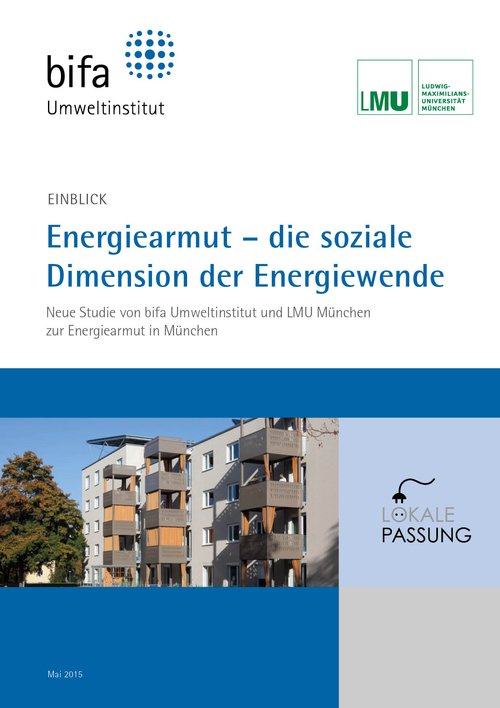Energy poverty in Munich
Whenever the turn of energy policy is discussed the talk is always about money; private households are increasingly affected by rising energy prices. Over a period of ten years (2004–2013), after adjusting the figures to take into account inflation, consumer prices for heating oil rose by 77 percent, the cost of natural gas by 27 percent, electricity rose by 42 percent and the cost of district heating increased by 38 percent. This cost explosion draws attention to a problem that is introduced to the debate by all kinds of different players from politics, social welfare associations and science with the catch phrase "energy poverty", as a social dimension of the turn of energy policies. According to the definition, somebody is "energy poor" if they are unable to heat their home appropriately and has problems paying for their electricity and gas bills. The study shows that in particular, factors such as the size of the home, number of people per residential unit, condition of the building, property type and educational level affect the extent of energy poverty.
There is no easy cure-all solution to combat energy poverty. Instead, measures must fit the local circumstances: Energy advice is especially effective if it is given by full-time energy consultant staff, who visit the households several times and give advice in situ, and when feedback loops with results monitoring are possible. If the housing market situation allows, funding higher "cold rents" (basic rent without any overhead costs such as utilities, services, insurance, rates, etc.) in exchange for presentation of the building's energy pass is an effective measure. Energy renovations are very important, not only for reducing CO2 emissions, but also for combating energy poverty. The negative effects of the government's energy policies can be prevented through information events and energy advice when people move into renovated apartments. Overall, the argument in favour of improved cost control through increased information about energy consumption is decisive. Only those who know how much they consume are able to adapt their behaviour accordingly.
Further information is given in the brochure "Einblick: Energiearmut – die soziale Dimension der Energiewende" (pdf. - in German only) available at www.bifa.de.
Einblick: Energiearmut - die soziale Dimension der Energiewende
(Mai 2015)
Einblick: Energiewende in der Gemeinde am Beispiel Baar, Holzheim, Münster und Thierhaupten
(März 2015)
![[Translate to Englisch:] Placeholder](/fileadmin/_processed_/f/4/csm_Header_Presse_d565a61df7.jpg)
